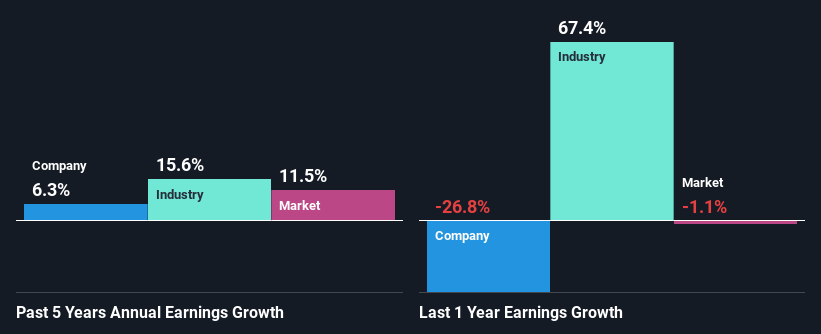Reckitt Benckiser Group plc's (LON:RKT) Stock Has Been Sliding But Fundamentals Look Strong: Is The Market Wrong?
Reckitt Benckiser Group (LON:RKT) has had a rough three months with its share price down 4.6%. However, stock prices are usually driven by a company’s financial performance over the long term, which in this case looks quite promising. In this article, we decided to focus on Reckitt Benckiser Group's ROE.
Return on equity or ROE is a key measure used to assess how efficiently a company's management is utilizing the company's capital. In other words, it is a profitability ratio which measures the rate of return on the capital provided by the company's shareholders.
Check out our latest analysis for Reckitt Benckiser Group
How Do You Calculate Return On Equity?
ROE can be calculated by using the formula:
Return on Equity = Net Profit (from continuing operations) ÷ Shareholders' Equity
So, based on the above formula, the ROE for Reckitt Benckiser Group is:
24% = UK£2.2b ÷ UK£9.2b (Based on the trailing twelve months to June 2023).
The 'return' is the profit over the last twelve months. So, this means that for every £1 of its shareholder's investments, the company generates a profit of £0.24.
Why Is ROE Important For Earnings Growth?
So far, we've learned that ROE is a measure of a company's profitability. We now need to evaluate how much profit the company reinvests or "retains" for future growth which then gives us an idea about the growth potential of the company. Assuming everything else remains unchanged, the higher the ROE and profit retention, the higher the growth rate of a company compared to companies that don't necessarily bear these characteristics.
A Side By Side comparison of Reckitt Benckiser Group's Earnings Growth And 24% ROE
First thing first, we like that Reckitt Benckiser Group has an impressive ROE. Second, a comparison with the average ROE reported by the industry of 7.7% also doesn't go unnoticed by us. Probably as a result of this, Reckitt Benckiser Group was able to see a decent net income growth of 6.3% over the last five years.
We then compared Reckitt Benckiser Group's net income growth with the industry and found that the company's growth figure is lower than the average industry growth rate of 16% in the same 5-year period, which is a bit concerning.
Earnings growth is an important metric to consider when valuing a stock. The investor should try to establish if the expected growth or decline in earnings, whichever the case may be, is priced in. This then helps them determine if the stock is placed for a bright or bleak future. Has the market priced in the future outlook for RKT? You can find out in our latest intrinsic value infographic research report.
Is Reckitt Benckiser Group Making Efficient Use Of Its Profits?
Reckitt Benckiser Group has a three-year median payout ratio of 41%, which implies that it retains the remaining 59% of its profits. This suggests that its dividend is well covered, and given the decent growth seen by the company, it looks like management is reinvesting its earnings efficiently.
Additionally, Reckitt Benckiser Group has paid dividends over a period of at least ten years which means that the company is pretty serious about sharing its profits with shareholders. Upon studying the latest analysts' consensus data, we found that the company's future payout ratio is expected to rise to 53% over the next three years. Regardless, the ROE is not expected to change much for the company despite the higher expected payout ratio.
Conclusion
In total, we are pretty happy with Reckitt Benckiser Group's performance. Specifically, we like that the company is reinvesting a huge chunk of its profits at a high rate of return. This of course has caused the company to see a good amount of growth in its earnings. On studying current analyst estimates, we found that analysts expect the company to continue its recent growth streak. Are these analysts expectations based on the broad expectations for the industry, or on the company's fundamentals? Click here to be taken to our analyst's forecasts page for the company.
Have feedback on this article? Concerned about the content? Get in touch with us directly. Alternatively, email editorial-team (at) simplywallst.com.
This article by Simply Wall St is general in nature. We provide commentary based on historical data and analyst forecasts only using an unbiased methodology and our articles are not intended to be financial advice. It does not constitute a recommendation to buy or sell any stock, and does not take account of your objectives, or your financial situation. We aim to bring you long-term focused analysis driven by fundamental data. Note that our analysis may not factor in the latest price-sensitive company announcements or qualitative material. Simply Wall St has no position in any stocks mentioned.

